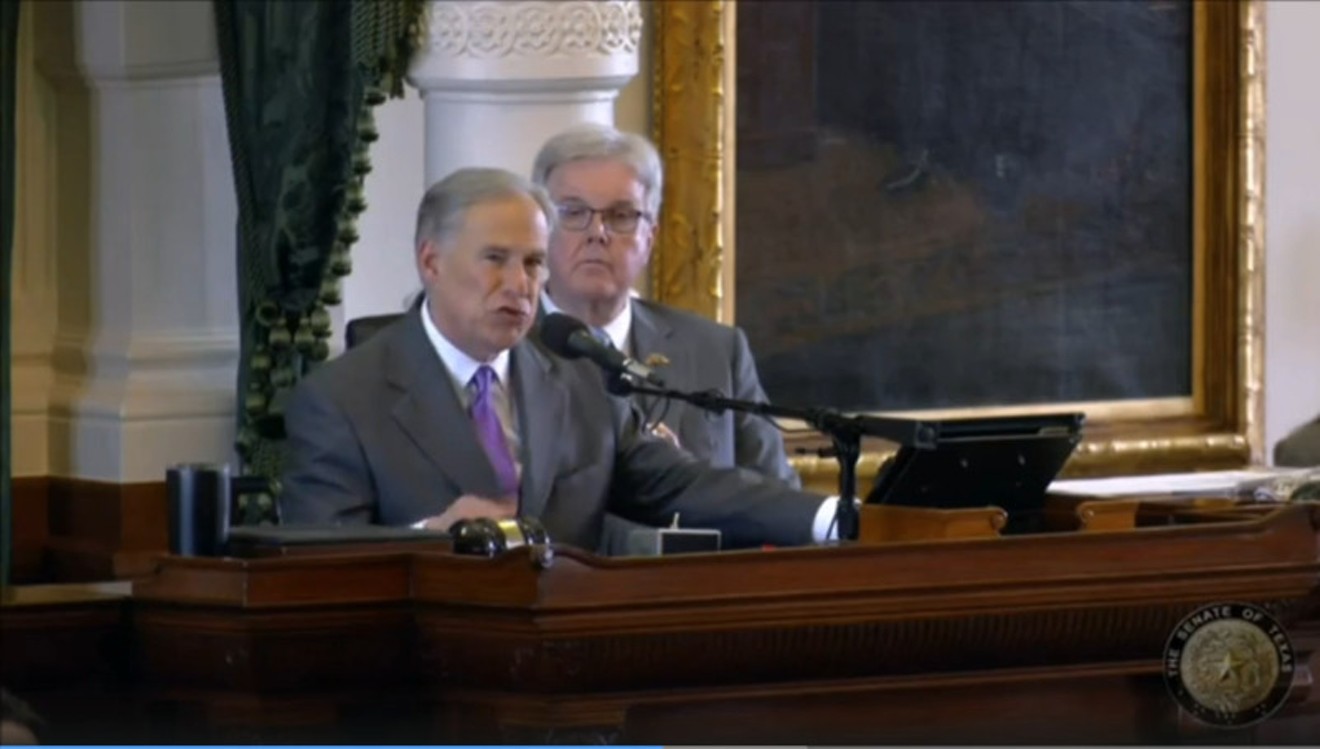On Day One of the 2023 Texas Legislative Session, there were good-hearted swearings-in amid a continued split between Governor Greg Abbott and Lieutenant Gov, Dan Patrick about what to do with the state’s estimated $32.7 billion bonus surplus and how to tackle property tax relief.
Abbott addressed the Senate, applauding the state's solid financial status which he attributed to the "hardworking people" of Texas as well as canny fiscal planning by the Legislature.
The governor has said he wants to use half of the windfall toward property tax cuts for Texas homeowners. Patrick, and several other Republican leaders, do not support this, saying it could break the spending cap. Instead, Patrick proposes increasing homestead exemptions as a way to lessen the tax burden on homeowners.
“Property tax relief is something that will in one way, or another pass this session, it is more a question of how the state is going to get money back in the hands of homeowners as well as how much,” said Mark P. Jones, Rice University political science professor.
On Monday, Texas Comptroller Glenn Hegar released a report, projecting that the state would have nearly $33 million in extra cash at the end of the 2022-23 biennium.
The property tax reductions proposed by Abbott could surpass the spending cap – the limit placed on how much additional money legislators can authorize allocating each year which is tied into the state’s economic growth rate. These would not be one-time expenditures and would require future funding. “This surplus is a one-time surplus, meaning it will place constraints on these areas that require future allocations of funds,” Jones said.
On Tuesday, Abbott said the recent consumer activity stimulating the economy and the population influx to the state, as well as the choices in the last legislative session led to this once-in-a-generation surplus.
“Paths could have been taken that would have spent money or not made effective use of the resources like some other states have done, and had we done that perhaps we would be in a budget deficit as opposed to a budget surplus,” Abbott said. “But, because of the policies that we have enacted, the policies that we have promoted, the freedom that we have allowed for entrepreneurs to operate in this state, those are contributing reasons why Texas does have this remarkable budget surplus that we're going to be able to use to change the state for the good.”
And despite the publicized discord over what to do with that surplus, Abbott said there was already a "coalescence" among both chambers of the Legislature "as to how to resolve the big issues we are facing and that should lead to an extraordinarily successful session.”
Members of both the House and the Senate convened at noon to begin proceedings and were later sworn in surrounded by their constituents and relatives. This marked the beginning of the 88th legislative session — a 140-day regular session that will last until the end of May.
Dade Phelan, R-Beaumont, assumed his position as House Speaker after an overwhelming majority vote in favor of his return for a second term. On the other side of the capitol building, Senator Kelly Hancock, R-North Richland Hills, was elected to serve as the Senate’s President Pro Tempore.
There are several other challenges that the Legislature will attempt to address with the extra money. According to Jones, Texans can expect portions of the surplus to go toward infrastructure, access to broadband internet and construction of gas-powered electricity plants.
In the last legislative session, $10 billion of the then-budget surplus was divided between the state’s Economic Stability Fund and highway system. Jones said this could happen again this legislative session, with the final allocations up to the vote of the Legislature.
Jones predicts that $10-$15 billion in funds will be distributed among the number of state priorities.
“What comes with the budget is the difficulty of deciding what the state’s priorities are and managing a lot of competition and contention about what to do with funds,” said James Henson, Texas Politics Project Director.
Henson pointed out that although Abbott has veto power over any legislation passed, he has limited influence on what the Legislature does leading up to a bill's passage and legislators have their own priorities.
“We still haven’t seen much of a consensus on what the priorities are,” Henson said. “For example, yesterday the comptroller provided a list of possible uses of the money and property taxes were a definite item but at the end of that list. While the comptroller was giving that speech, the lieutenant governor released a statement saying that property tax was the number one priority.”
Another heavily discussed item on the agenda of this legislative session is border security. Abbott has announced that he wants increased funding for his border security system, Operation Lone Star.
“We know that in this upcoming session, the governor is going to do everything he can to further codify Operation Lone Star into the fabric of our laws,” said Laura Peña, Beyond Borders Legal Director at the Texas Civil Rights Project.
This follows a $2 billion allocation to the operation during the last legislative session. Another $2 billion in funds were provided to the project after Abbott used his disaster authority to distribute these additional funds, Peña said.
“One of the things that we will be looking very closely at are these executive powers that Abbott can again circumvent in the Legislature to spend even more money on Operation Lone Star,” Peña said. “He’s declared it a disaster before, and it is an urgent humanitarian issue, but it does not rise to the level of disaster declaration.”
According to Peña, increased security isn’t even what border communities need. Instead there is a need for mental health resources, assistance with the widespread drug usage seen in those areas, and funds for improved infrastructure — particularly in the areas that are vulnerable to flooding.
Social issues also take up space in the Legislature’s agenda, Jones said.
“I expect a continuation of discussion of gender-affirming therapy and the teaching of sexuality in public schools focused on in the legislative process,” Jones said. “As well as bans restricting abortion, though the Republicans were quite successful in the 2021 session in regard to reproductive rights’ restrictions.”
According to Rachel Hill, Government Affairs director of Equality Texas, the Legislature has seen at least 11 bills targeting gender-affirming care. “When we say this is lifesaving care, we really mean it, this health care is often the difference between life or death for transgender Texans,” Hill said.
Hill said some of the families she has assisted in her work have gone so far as to choose to leave Texas as laws like the ones that are being filed in this session, started to appear in the prior legislative session.
“The products of these bills are treating something so ordinary, as just someone’s sexual orientation or gender identity, as taboo,” Hill said. “This isn’t even about sexual education or anything like that, this is literally just talking about the fact that LGBTQ+ people exist.”
Jones said he expects the House to be less conservative, while the Senate will be more conservative in regard to negotiations over legislation pertaining to these social issues.







